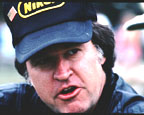 Grassroots
Grassroots 
Sad Subjects
Death has a way of sneaking up and reminding you that this isn't a drill
Have you ever noticed how death doesn't mean anything to most of us until it hits close to home? It's like lightning is a far off, flashy intellectual concept until it explodes a tree in your front yard forcing you to give it respect.
Aviation, unfortunately, hides the black shadow of death under a mantle of philosophical optimism. We glory in flight but sometimes forget it kills. It doesn't strike us down often, but it happens often enough we shouldn't forget it. It makes the everyday concept of mortality a little more concrete.
I lost several aviation friends last year. One was a good death, if there is such a thing. One was not. Another was truly tragic. One was bad because it was out of time. Out of sequence with the natural flow of life. Jeff was far too young with far too much to give the world. But, something went wrong, the flying machine fell to Earth and the wildly talented and smiling spirit that was Jeff was gone. That spirit wasn't ready to leave. It was forced to leave by the confluence of a series of events controlled by mechanics and the laws of physics.
Leo's passing was so tragic, it's hard to discuss rationally.
Bill, on the other hand, died a good death. It too was slightly out of sequence, but not nearly so much as the others. In reality, there probably is no such thing as a good death, if only because of the pain it causes those left behind. Still, if there is such a thing as a good one, Bill's was it. He had just finished flying an airshow performance and laid down beneath his airplane for a quick nap. He never woke up. Simple as that. The last thing he smelled was the heady gasoline/hydraulic mix that is the cologne of the warbird. The last sounds his mind processed were those of an airshow announcer and the rise and fall of an airplane engine doing its airshow routine. His spirit had had enough and was ready to leave. So it did.
We'll miss him, but at the same time, just a little bit in each of us can't help but envy Bill. It was almost as if he had picked his place and time. He was totally in his element and the sweat of his last performance was still cooling on his skin, when his heart stopped beating. Yes, he died too young. At least too young when measured in normal people-years. When measured in Bill-years, however, the span was apparently exactly what it was supposed to be. If it hadn't been, Bill wouldn't have died and his life may have ended in a far different, not nearly so natural manner.
Death is one of those shiny, too bright concepts we often avoid discussing and turn our heads so as not to look at it directly. It is only when we lose someone close that we face it directly. That's when we see our own reflection in its hard, black surface.
It's at times like this when we begin to think how it's going to end for us and how we're going to handle it. We picture our friends and family acting out the exact same scenes we're now acting out for Bill and Jeff. And, of course, Leo. We can't possibly forget him. The difference this time, however, is we will be the center of attention. And the cause for grieving.
My father is 90 years young and still writes a column for the local newspaper. In one of those columns he freely admitted to one of the things many of us think about. He talked about lying in his coffin watching his own funeral in progress. He wondered whether it would be well attended and what people would be saying about him. Knowing dad, he was also probably trying to figure his cut of the gate, when he wrote that piece.
I marvel at the way he tries to make each day earn its keep. Although he's very aware of his years, he doesn't see them as drawing to a close, but continually stacking one on top another and giving him something to remember. But, obviously, he thinks about his death. We all do. Most of us anyway.
Actually, now that I think about it, that last statement isn't entirely true. Those in the first third of life don't think about their death. Youth has a way of obscuring the realities of death because it is a "someday" thing that forms the basis for movie plots but is not yet a part of life. And that's what makes youth both so precious and, at the same time, so dangerous.
Youth is accompanied by that all-pervasive feeling of immortality. Which is precisely why so many throw their youth away. It is one of life's greatest tragedies that we don't gain an appreciation for either youth or life until they are nearly gone.
We all know the old-bold pilot saying. That's based on the same concept: young pilots are historically more bold than older ones. They haven't yet developed the proper respect for both life and death. The contradiction here is that, as they become older, more conservative pilots, they actually do become as good as they thought they were when they were young.
To properly place value, it seems, the first thing that has to die is our youth. That's a shame and it makes life appear to be constructed in a thoroughly backward, slightly cruel order. It would make more sense if we were born with the wisdom to appreciate and then drifted into a feeling of invincibility as life draws to a close.
I hate the fact that I lost some friends. Their passing has, however, made me that much more aware of what's important. I hope all of us who knew them alter our personal courses accordingly. To the families of Jeff, Bill and Leo: They were good people. The absolute best. We should all be so lucky as to leave that kind of legacy.